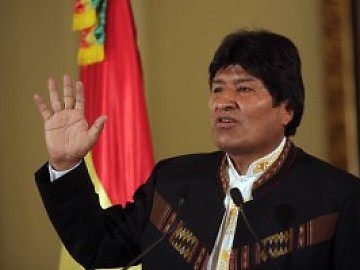
(above) Evo Morales
Bolivia's Morales Enacts New Constitution
February 8, 2009 - Latin American Herald Tribune
El ALTO, BOLIVIA -- Bolivian President Evo Morales on Saturday enacted a new constitution that he says will "refound" the country on the basis of unity, equality and dignity and put it on a path to national reconciliation.
"Mission accomplished. For the refounding of a united Bolivia," Morales said in enacting a charter that was approved by popular vote in a referendum held on Jan. 25.
The ceremony was held in El Alto, a highland municipality near La Paz that is a bastion of support for Morales, a socialist and Aymara Indian who is the country's first indigenous head of state.
Morales, officials with his administration, top armed forces brass and thousands of ordinary Bolivians gathered for the occasion took a collective oath to "respect and ensure respect for" the new constitution.
On Jan. 25, 61.4 percent of the Bolivian population voted in favor of the new constitution in a referendum.
Key elements of the charter include allowing presidents to serve two consecutive five-year terms, meaning that Morales will be able to run for re-election in December.
The constitution also recognizes the self-determination of 36 Indian "nations" and protects the right of indigenous communities to impart "community justice"; limits the size of future landholdings to 5,000 hectares (12,000 acres); and stipulates the election of high-court judges.
It also allows lowland, opposition-led provinces to create state assemblies to govern local issues, although that control does not extend to decisions about land reform or the allocation of natural gas revenues.
The majority of voters in the lowland, mestizo and relatively prosperous provinces of Santa Cruz, Beni, Tarija and Pando voted against the constitution, which is viewed by many there as the first step in Morales' effort to turn Bolivia into a Cuban-style communist state. EFE